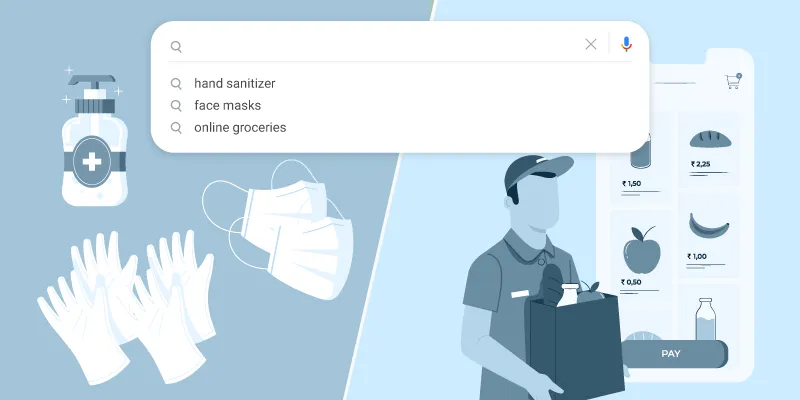Masks, meeting apps, and more: Here’s what India searched online during the coronavirus lockdown
Amidst the coronavirus lockdown, Indians have been looking up a variety of things online to adapt to the ‘new normal’, which is more homebound, lonely, and limited.
Online searches are often a good indicator of consumer behaviour. Searches typically vary across geographies, demographics, languages, etc., chronicling the unique consumption patterns, interests, concerns, and eccentricities of a populace.
In India, for instance, Bollywood and cricket searches almost always top the list. Unless it’s election season when polls and politicians take over. As it happened in 2019 (Lok Sabha elections) and even in early 2020 when ‘Delhi election results’ was India’s most searched term, according to Yahoo.
But towards the end of February, online searches almost got synchronised across territories. After all, in the middle of a ‘once-in-a-century’ pandemic, what else could possibly consume people?
As the coronavirus outbreak took over our lives and mind space, searches for terms related to the deadly disease skyrocketed.

In India, ‘coronavirus’ was searched a jaw-dropping 1.6 crore times in the last two months. This was up from just 2,400 times in December when news of the outbreak in China was first reported, according to SEMrush (a Boston-based online visibility management platform that uses 30 tools to collect search data for 140 countries).
Further, the term ‘coronavirus symptoms’ was searched 12.2 lakh times compared to a mere 40 times in December. Keywords like ‘coronavirus disease’, ‘coronavirus treatment’, ‘coronavirus cause’, ‘coronavirus infection’, ‘coronavirus vaccine’, ‘coronavirus diagnosis’, and ‘novel coronavirus’ also gained traction.
Each of these keywords has been searched close to one lakh times in India.
A separate study by Yahoo indicates that as the coronavirus spread intensified around mid-March, terms like ‘lockdown in India’, ‘social distancing’ (a relatively new term for most people) and ‘hydroxychloroquine for coronavirus’ — the anti-malarial drug that India is a leading producer of — shot up.
‘HCQS’ searches went up further when President Donald Trump described the drug as one of the “biggest game changers in the history of medicine”, and called it a potential cure. Later, Trump even coerced India to export the drug to the US, and HCQS was trending on desi Twitter for 48 hours.

After India went into a nationwide lockdown, people were faced with newer challenges such as remote working, a dearth of essential items like groceries, and even issues like stress and boredom, which compelled them to look for online games, social media apps, and entertainment to stay engaged.
Fernando Angulo, Head of Communications, SEMrush, explains,
“There is a huge migration underway in the second-most populous country in the world. Tens of millions are migrating to virtual meeting apps, social media sites, and OTT platforms. This migration is unlike any other the country has experienced. While it was bound to happen over the next few decades, the COVID-19 pandemic has accelerated it. What would have taken years will happen in a few short months.”
India’s search results in the last four weeks bear testimony to its new needs.
Searches for virtual meeting apps
Virtual conferencing apps and remote collaboration tools have been the biggest gainer of the pandemic — both in terms of users and online buzz.
Zoom searches went up 809 percent in a month; Google Hangouts and Microsoft Teams gained 307 percent each, and Gotomeeting searches grew 173 percent.
According to SEMrush,
“Data strongly suggests most people searching for the mentioned apps didn’t use them before the lockdown, which is why they are being searched in record numbers. This trend is evident by the surge in searches for work-related apps like Zoom, Google Hangouts, Microsoft Teams, and Gotomeeting.”
Silicon Valley startup Zoom’s meteoric rise has been well-documented as it became the default virtual meeting platform globally. Entrepreneurs point out that Zoom is now a verb — like Google — and synonymous with remote working.

Image: YS Design
From schools and universities to enterprises and even individuals, almost all consumer sets have taken to Zoom, leading to the exponential growth in searches.
“Indians, who had to overnight work and learn from home, searched for a new class of products and tools to stay productive,” explains Yahoo in its study.
Interestingly, before the lockdown was implemented, India searched for Skype more than Zoom. Skype searches grew by an astounding 1,150 percent in early March as people searched for ways to stay connected with friends and relatives.
But with remote working becoming the all-pervasive reality after the lockdown, virtual meeting apps dominated search trends. In fact, searches for ‘work from home’ spiked a massive 733 percent, according to Yahoo.
Data analysts now believe that Zoom searches could decline slightly in April as word-of-mouth around its security mishaps grows. “However, despite the smaller percent increase in searches for Zoom, in absolute terms, more people are expected to search for the platform, which only goes to highlight its popularity,” says Fernando.
Searches for essential items
The supply of daily essentials like groceries has been dented by the nationwide lockdown. Transportation woes, reverse migration of contractual labour, and various other logistical hurdles have thrown the agri and food supply chain out of gear.
This has led to anxiety and panic buying among consumers, leading to serpentine queues outside stores and supermarkets, and crashing servers or drying up slots on online grocery platforms.

Image: YS Design
As a result, the quest for essential items remains unabated. This has led to a surge in online searches for grocery-related terms.
Yahoo data shows searches for ‘online food delivery’ and ‘online grocery’ rose by a whopping 2,400 percent and 4,900 percent respectively since the lockdown began. interestingly, a direct causal reaction of the coronavirus has also been recorded in searches for newly essential items like hand sanitisers and face masks.
Online searches of ‘n95 mask’, ‘n95 mask price’, and ‘3m n95 mask’ increased by an extraordinary 1,017 percent, 3,002 percent, and 1,962 percent respectively.
Other mask-related keywords including ‘n95 respirator mask’, ‘n95 pollution mask’, ‘n95 face mask’, ‘medical mask’, ‘n95 mask uses’, ‘n95 mask price in India’, and ‘n95 mask reusable’ also went up significantly, according to SEMrush.

Searches for ‘n95 respirator mask’ particularly went up by an incredible 10,400 percent since the outbreak in December. Throwing light on the mask mania, Fernando shares,
“Indians actively try to protect themselves from epidemics, even when their epicentre is distant and the possibility of infection relatively low. The N95 face mask was a relatively unknown product before the coronavirus epidemic; today, it is less so. The reason behind the increase in searches for N95 masks is apparent; Indians are scouting for the best preventive tool."
In comparison, searches for hand sanitisers grew by a modest 82.43 percent, possibly because sanitisers were not an entirely unknown commodity prior to the pandemic.
Sanitiser sales, however, hit the roof, both online and offline.
Entertainment and social media searches
OTT entertainment and social media platforms have been the fastest-growing segments of India’s internet ecosystem in recent years.
But the pandemic has presented a unique opportunity for these services to prosper. With millions of people homebound, attempts to stay engaged has led to increased consumption of streaming services, chat and social video apps.
Video streaming platforms Watch2gether, Netflix, Amazon Prime Video, and Alt Balaji, were searched extensively in the last month-and-a-half. SEMrush reveals that searches for Watch2gether and Netflix increased by 184 percent and 173 percent respectively.

Image: Flickr
With outdoor entertainment options drying up, OTT subscriptions are also on the rise. Searches with keywords ‘Netflix subscription’ and ‘Amazon Prime subscription’ went up by 193 percent and 162 percent over the last month.
Interestingly, searches for ‘Apple TV subscription’ grew by a mere 22 percent, indicating its low uptick in a price-conscious market. Hotstar searches remained flat, despite the launch of Disney Plus in India in March-end. This could be because the homegrown service is already hugely popular, accounting for over 300 million users.
The biggest surprise in entertainment searches was Ramayana — the iconic Doordarshan show from the late 80s — that is now being re-telecast by Prasar Bharati. “Ramayana broke through overnight to become the top entertainment search,” says Yahoo.

Meanwhile, social media searches continued to rise through the lockdown. Top gainers have been Snapchat and TikTok, besides Facebook’s suite of apps.
TikTok searches increased nearly 50 percent in two months while Snapchat searches topped in April, growing by 30 percent.
Unsurprisingly, online gaming searches went up by 300 percent. The biggest spike was reported in Counter-Strike searches, which went up by 1,011 percent while ‘puzzles’ shot up by 1,566 percent, driven by young children looking for indoor pastimes.
Other top search trends
Some search terms enjoyed sudden temporary spikes.
For instance, Bollywood singer Kanika Kapoor became India’s most-searched celebrity in March after she tested positive for COVID-19.
She surpassed celeb search list toppers Deepika Padukone, Priyanka Chopra, and Amitabh Bachchan, according to Yahoo.

Image: YS Design
Recent social media craze ‘Dalgona Coffee’ too made an impact on searches, becoming India’s most searched food term. It went ahead of the usual A-listers cake, paneer, chicken, and breakfast recipes.
In April, mental health-related searches are on the upsurge, as per Google Trends. Interest in terms like ‘stress’, ‘loneliness’, and ‘therapy’ has grown. ‘Domestic violence’, ‘online therapy’, and ‘online learning’ searches are also peaking.
Analysts say India’s search trends are as diverse and eclectic as the country itself. But, at its core, lies people’s concern about the ongoing crisis.
Fernando sums up by saying, “While there has been a huge surge in searches for online video streaming services, their numbers are eclipsed by searches for practical services and equipment... Indians are pragmatic people and with a crisis afoot, their biggest concerns are keeping in touch with friends and family, ensuring nobody goes hungry, and the safety of their loved ones.”
Edited by Saheli Sen Gupta




![[App Fridays] Zoom rival Cisco WebEx becomes India’s #2 virtual meeting tool amid coronavirus](https://images.yourstory.com/cs/2/dc9aa1302d6c11e9aa979329348d4c3e/AppFridayCiscoWebex-02-1587645717512.png?fm=png&auto=format&h=100&w=100&crop=entropy&fit=crop)
1564671114666.png?fm=png&auto=format&h=100&w=100&crop=entropy&fit=crop)





